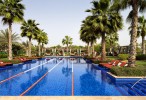As more and more corporations include a commitment to the environment as part of their mission statements, the demand for conference facilities to reflect this commitment increases.
Meeting and event planners are often asked to use suppliers that offer the best environmental options, and hotels must stick to a few key guidelines if they want to remain competitive in this environment:
• Participate in preserving environmentally sensitive areas.
• Fulfil corporate and personal environmental mandates.
• Educate and inform delegates about environmental and heritage issues.
• Provide high quality services and good value.
• Enhance services through a continuous commitment to environmental stewardship.
How would your facility rate if a planner called and asked you to describe, for example, how you encourage recycling, how often you used disposable products, or whether a conference that emphasises protecting the environment will cost the client more? While they may not ask, you can also be sure that during a site inspection planners will be looking to see how visible your hotel's commitment to the environment is.

Advertisement
In light of these concerns, Fairmont developed the Eco-Meet programme. This grew out of our participation in the Meetings Professionals International Green Meetings Task Force, which appointed Fairmont Hotels and Resorts as a member.
The components of Eco-Meet
The Eco-Meet programme helps meeting planners by providing a meeting structure that encourages maximum waste diversion and environmental awareness for conference delegates.
Eco-Meet consists of options that can be tailored to the individual needs of the client, so they can meet their environmental goals while choosing how ‘green' they want to go. There are four main components of Eco-Meet:
Eco-service
Do you provide ‘disposable-free' food and beverage services? This service is an important element of greener meetings and includes, for example, the use of china and cutlery instead of disposal items, linen napkins instead of paper and white boards rather than paper flip charts. Ask yourself the following:
• Is a Corporate Environmental Policy available?
• Are environmental educational materials made available to planners and delegates, such as the Green Partnership brochure, Green Partnership press material or the Green Partnership Guide?
• Are white boards used rather than flip charts?
• Are leftover conference supplies reused or donated?
• Is the use of promotional collateral kept to a minimum?
Eco-accommodation
This means that we offer in-room information, energy-efficient lighting, water-conserving showerheads, toilets and tap aerators. The programme also stipulates that an environmental audit of the hotel must have been completed in the last two years.
• Is a recycling programme in place?
• Does the property use eco-conscious cleaning products?
• Are there water conserving fixtures in the guest room, including tap aerators and so on?
• Are the hotel grounds irrigated with grey water?
• Are low Volatile Organic Compound (VOC) materials used in guestrooms - paints, carpets, wall coverings - in order to ensure air quality?
• Is energy efficient lighting used in guestrooms and meeting rooms?
• Are programmable thermostats used in guest rooms?
• Is an energy efficient HVAC system in place?
• Have guest rooms got an established temperature set point?
• Is natural light used whenever possible to minimise lighting?









 Search our database of more than 2,700 industry companies
Search our database of more than 2,700 industry companies









